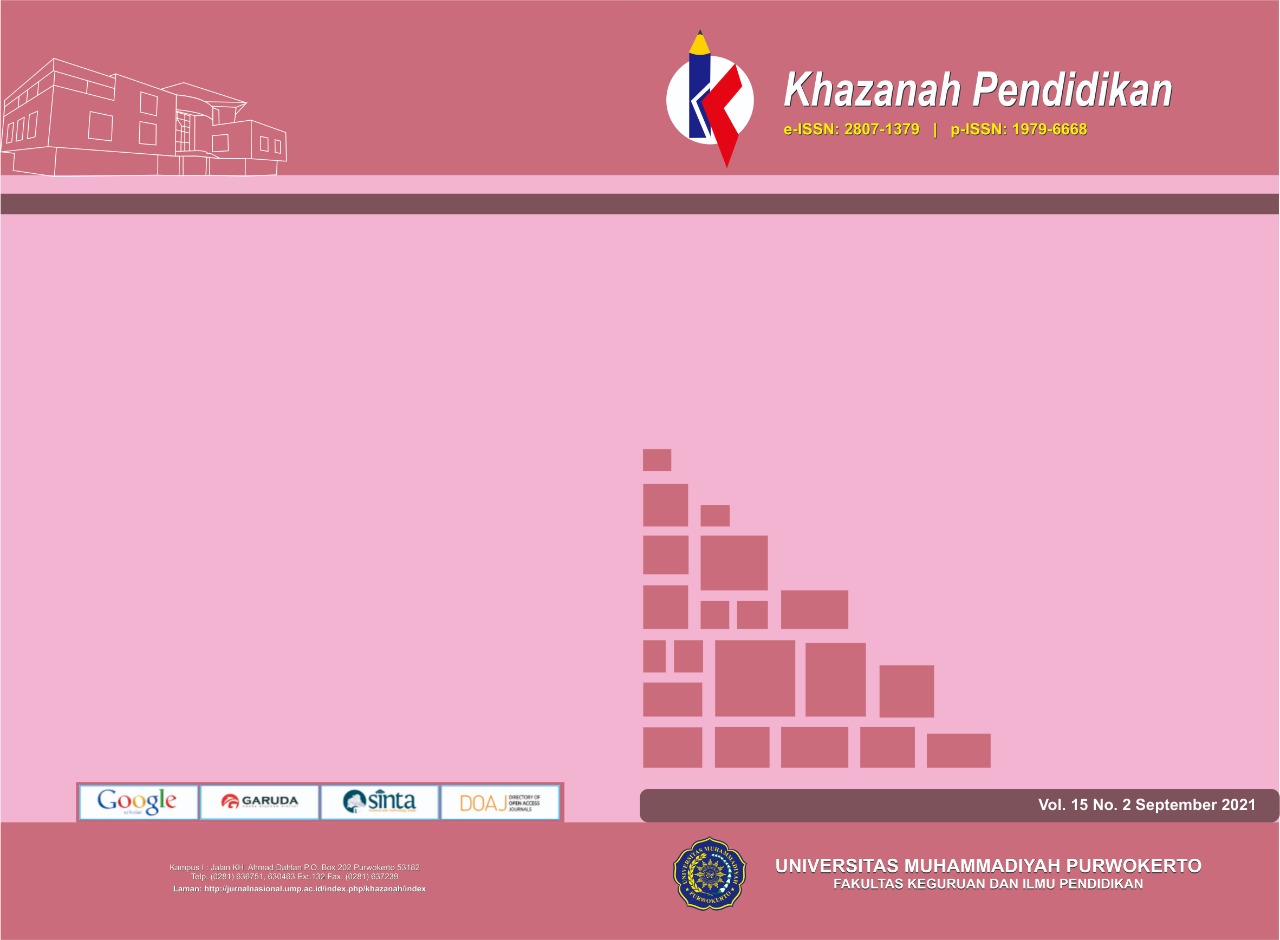PENGARUH BUDAYA ORGANISASI SEKOLAH, KOMUNIKASI DAN KOMPETENSI GURU TERHADAP KINERJA GURU DI SMK YP SATRYA BUDI KARANG REJO KABUPATEN SIMALUNGUN
DOI:
https://doi.org/10.30595/jkp.v15i2.11757Keywords:
Keywords, Organizational Culture, Communication Teacher, Competence and Teacher PerformanceAbstract
This study aims to examine the influence of school organizational culture, communication and teacher competence on teacher performance either partially or simultaneously. The sample in this study were teachers of SMK YP Satrya Budi Karang Rejo, Simalungun Regency, totaling 45 people. Data analysis techniques in this study using quantitative techniques. The data in this study are primary data. Data was collected using a questionnaire. The analytical method used is the Multiple Linear Regression model. To test the hypothesis simultaneously the F test is used and partially the t test is used. The results of the tests carried out with SPSS obtained multiple regression equations: Y = 1.822 + 0.179 X1 + 0.207 X2 + 0.237 X3 which means a constant value of 1.822 which indicates that if the school's organizational culture, communication and teacher competence are assumed to be zero, then the value of performance teacher is 1,822. If the independent variable increases by 1%, the teacher's performance will increase. The results of the t-test hypothesis of the research variable are the Organizational Culture variable obtained tcount 2.143 with a significant probability of 0.038 less than the level of confidence (level of significant) = 0.05, Communication variable obtained tcount 2.071 with significant probability 0.045 less than the level of confidence (level of significant) = 0.05, the variable Teacher Competence obtained tcount 2.207 with a significant probability of 0.033 less than the level of confidence (level of significant) = 0.05. So the decision taken is to reject H0 and accept Ha, meaning that school organizational culture, communication and teacher competence have a positive and significant effect on teacher performance at YP Satrya Budi Karang Rejo Vocational School, Simalungun Regency.
References
Agung, Lilik. 2007. Human Capital Competencies. Jakarta : Elex Media Kumutindo
Arikunto,S. 2018. Prosedur Penelitian: Suatu Pendekatan Praktik. Jakarta: Rineka Cipta.
Arikunto, S. 2013. Prosedur Penelitian: Suatu Pendekatan Praktik. Jakarta: Rineka Cipta.
Arikunto, Suharsimi. 2010. Prosedur Penelitian Suatu pendekatan Praktek. Jakarta: Rineka Cipta.
Bangun, Wilson. 2012. Manajemen Sumber Daya Manusia. Jakarta : Erlangga.
Draft, Richard L. 2007. Management-Manajemen, Buku 1, Edisi 6. Jakarta: Salemba Empat.
Dessler, Gary, 2004. Manajemen Sumber Daya Manusia, Edisi 9, Jilid 1, Kelompok Gramedia, Jakarta.
Dewi, Sutrisna. 2007. Komunikasi Bisnis. Yogyakarta: Andi.
Dewi, Sandra. 2007. Teamwork. Bandung: Penerbit Progressio.
E.Mulyasa. 2007. Standar Kompetensi dan Sertifikasi Guru. Bandung: PT. Remaja Rosdakarya
Fauza,Sabrina.2010.http://sabrinafauza.wordpress.com/2010/04/05/faktor-faktor yang mempengeruhi kinerja guru/diakses 2016
Griffin, Ricky W. 2002. Manajemen. Jakarta : Penerbit Erlangga
............................. 2003. Manajemen, Jilid Dua, Edisi Ketujuh, Jakarta : Erlangga.
Hamalik, Oemar. 2011. Pendidikan Guru Berdasarkan Pendekatan Kompetensi. Jakarta: Bumi Aksara
Lie, Darwin.2012. Analisis Pengaruh Kepempinanan Kepala Sekolah, Budaya Organisasi Sekolah, Kompetensi Guru Terhadap Motivasi Dan Komitmen Guru serta Implikasinya Terhadap Kinerja Guru (Studi Kasus Pada SMA di Lima Kabupaten-Kota Provinsi Sumatera Utara). Bandung: Universitas Paundan. Disertase
Munandar, Ashar Sunyoto. 2001. Psikologi Industri dan Organisasi. Universitas Indonesia (UI Press). Depok
Luthans, Fred. 2006. Perilaku Organisasi. Yogyakarta: Penerbit Andi.
Mondy, R. Wayne. 2008. Manajemen Sumber Daya Manusia, Edisi X, Jilid 1. Jakarta: Erlangga
Musfah, Jejen. 2012. Peningkatan Kompetensi Guru. Jakarta: Grasindo
Permendiknas Nomor 16 Tahun 2007 tentang Standar Kualifikasi Akademik dan Kompetensi Guru.
Purwanto, Djoko. 2006. “Komunikasi Bisnis”. Edisi Ketiga. Surakarta : Erlangga
Rivai, Veithzal. 2004. Manajemen Sumber Daya Manusia Untuk Perusahaan. Jakarta: Salemba Empat.
Prof.Dr.Ir.Tb.Sjafri Mangkuprawira,2001, Manajemen Sumber Daya Manusia StrategikCet.1 Ed.2,Bogor,Penerbit Galih Indonesia.
Riduwan. 2005. Skala Pengukuran Variable Penelitian. Bandung : Alfabeta.
Riduwan 2008. Pengantar Statistika Untuk Penelitian Pendidikan, Sosial, Ekonomi, Komunikasi, dan Bisnis . Bandung: Alfabeta
Robbins, Stephen. 2006. Perilaku Organisasi, Edisi ke Sepuluh. Jakarta: Prenhallindo.
Robbins, Stephen P dan Timothy A Judge. 2008. Perilaku Organisasi, Jakarta : Salemba Empat.
Santoso, Singgih. 2000. Buku Latihan SPSS Statistik Parametrik. Jakarta: PT Elex Media Komputindo.
Sekaran, U. 2006. Metodologi Penelitian untuk Bisnis. Edisi 4. Jakarta: Salemba Empat.
Solihin, Ismail. 2009. Pengantar Manajemen. Jakarta : Penerbit Erlangga
Suharsono dan Lukas. 2013. Komunikasi Bisnis. Yogyakarta : CAPS.
Sugiyono. 2016. Metode Penelitian Kuantitatif, Kualitatif dan R&D. Bandung: PT Alfabet.
Sugiyono, 2013, Metodelogi Penelitian Kuantitatif, Kualitatif Dan R&D. (Bandung: ALFABETA)
Sule, Ernie Tisnawaty dan Kurniawan Saefullah. 2005. Pengantar Manajemen, Edisi Pertama. Jakarta: Prenada Media Group
Suliyanto. 2011. Ekonometrika Terapan: Teori dan Aplikasi dengan SPSS. Yogyakarta: ANDI.
Supranto. J. 2009. Statistik Teori dan Aplikasi. Edisi ketujuh. Jilid 2. Penerbit Erlangga. Jakarta
Sutrisno, Edy. 2010. Budaya Organisasi, Edisi Pertama, Cetakan ke-1. Jakarta: Kencana Prenada Media Group.
Undang-Undang Republik Indonesia No. 14 tahun 2005 tentang Guru dan Dosen.
Wibowo. 2016. Manajemen Kinerja, Edisi Kelima. Rajawali Pers
Yamin, H Martinis dan Maisah. 2010. Standarisasi Kinerja Guru, Cetakan Pertama, Jakarta: Gaung persada
Zwell, Michael. 2000. Creating a Culture of Competence. New York: John Wiley & nSons, Inc
Downloads
Published
Issue
Section
License
Authors who publish with this journal agree to the following terms:
Authors retain copyright and grant the journal right of first publication with the work simultaneously licensed under a Creative Commons Attribution License that allows others to share the work with an acknowledgement of the work's authorship and initial publication in this journal.
Authors are able to enter into separate, additional contractual arrangements for the non-exclusive distribution of the journal's published version of the work (e.g., post it to an institutional repository or publish it in a book), with an acknowledgement of its initial publication in this journal.
Authors are permitted and encouraged to post their work online (e.g., in institutional repositories or on their website) prior to and during the submission process, as it can lead to productive exchanges, as well as earlier and greater citation of published work (See The Effect of Open Access).

Khazanah Pendidikan is licensed under a Creative Commons Attribution 4.0 International License.


